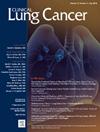在多元化安全网环境中识别和治疗肺癌致癌因素
IF 3.3
3区 医学
Q2 ONCOLOGY
引用次数: 0
摘要
对携带致癌驱动因素的非小细胞肺癌(NSCLC)患者的检测和治疗取得了进展,从而改善了治疗效果。但人们对不同患者群体的检测和治疗模式知之甚少。我们对在约翰-彼得-史密斯安全网医疗系统接受治疗的不同患者群体进行了一项回顾性研究。我们确定了基于血液和组织的检测模式,以及对发生和改变的患者的治疗模式。我们使用 Cox 比例危险回归模型来评估和检测的影响。共纳入了 220 名患者,其中 97 人(44%)为非西班牙裔白人,72 人(33%)为黑人,28 人(13%)为西班牙裔,23 人(10%)为亚裔。亚裔患者的变异频率最高(45%),其他群体的变异频率相当(6-13%)。西语裔(13%)和亚裔(11%)患者的改变频率最高,黑人和非西语裔白人患者的改变频率均为 2%。在多变量模型中,未进行检测与生存率降低有关(aHR 1.6; = .003),而检测结果呈阳性(aHR 0.43; = .01)或(aHR 0.28; = .04)与生存率提高有关。种族和民族与生存率差异无关。随着NSCLC致癌基因突变分子检测的增加,在所有种族-民族群体中都能发现可药用的基因突变,如和,而且这些基因突变与预后的改善有关。本文章由计算机程序翻译,如有差异,请以英文原文为准。
Identification and Treatment of Lung Cancer Oncogenic Drivers in a Diverse Safety Net Setting
Introduction
Advances in the testing and treatment of patients with non-small cell lung cancer (NSCLC) harboring oncogenic drivers have improved outcomes. Little is known about testing and treatment patterns in diverse patient populations.
Methods
We conducted a retrospective study in a diverse cohort of patients treated in the John Peter Smith safety net healthcare system. We determined patterns of blood- and tissue-based testing and treatment of patients with EGFR and ALK alterations. Cox proportional-hazards regression models were used to assess the impact of EGFR and ALK testing.
Results
A total of 220 patients were included, 97 (44%) were non-Hispanic White, 72 (33%) were Black, 28 (13%) were Hispanic, and 23 (10%) were Asian. EGFR and ALK testing increased over time from 55% and 52%, respectively, in 2017 to 87% and 82%, respectively, in 2021. Frequency of EGFR alterations were highest in Asian patients (45%) and comparable among other groups (6-13%). Frequency of ALK alterations were highest in Hispanic (13%), and Asian (11%) patients, and were 2% for both Black and non-Hispanic White patients. In a multivariate model, lack of testing was associated with worse survival (aHR 1.6; P = .003) and testing positive for EGFR (aHR 0.43; P = .01) or ALK (aHR 0.28; P = .04) was associated with improved survival. Race and ethnicity were not associated with survival differences.
Conclusion
As molecular testing for oncogenic mutations in NSCLC increases, druggable alterations such as ALK and EGFR can be identified in all race-ethnicity groups and are associated with improved outcomes.
求助全文
通过发布文献求助,成功后即可免费获取论文全文。
去求助
来源期刊

Clinical lung cancer
医学-肿瘤学
CiteScore
7.00
自引率
2.80%
发文量
159
审稿时长
24 days
期刊介绍:
Clinical Lung Cancer is a peer-reviewed bimonthly journal that publishes original articles describing various aspects of clinical and translational research of lung cancer. Clinical Lung Cancer is devoted to articles on detection, diagnosis, prevention, and treatment of lung cancer. The main emphasis is on recent scientific developments in all areas related to lung cancer. Specific areas of interest include clinical research and mechanistic approaches; drug sensitivity and resistance; gene and antisense therapy; pathology, markers, and prognostic indicators; chemoprevention strategies; multimodality therapy; and integration of various approaches.
 求助内容:
求助内容: 应助结果提醒方式:
应助结果提醒方式:


